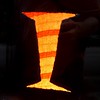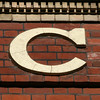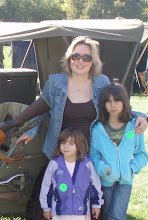 Yum. Again, Del.icio.us is something I have been meaning to do for some time, but never found "some time." The budding librarian in me gets a little overwhelmed at the possibility of the variety of tags one could use. I typed a simple "frugal-living" tag for a blog I follow, then looked to see what others had tagged: cooking, coupons, recipes, frugal, budget, food, frugality. This is from just a little blog that only 25 people have tagged. Others are even more crazy. As Vonnegut was so fond of saying, "So it goes."
Yum. Again, Del.icio.us is something I have been meaning to do for some time, but never found "some time." The budding librarian in me gets a little overwhelmed at the possibility of the variety of tags one could use. I typed a simple "frugal-living" tag for a blog I follow, then looked to see what others had tagged: cooking, coupons, recipes, frugal, budget, food, frugality. This is from just a little blog that only 25 people have tagged. Others are even more crazy. As Vonnegut was so fond of saying, "So it goes."Thursday, October 30, 2008
#13 Del.icio.us
 Yum. Again, Del.icio.us is something I have been meaning to do for some time, but never found "some time." The budding librarian in me gets a little overwhelmed at the possibility of the variety of tags one could use. I typed a simple "frugal-living" tag for a blog I follow, then looked to see what others had tagged: cooking, coupons, recipes, frugal, budget, food, frugality. This is from just a little blog that only 25 people have tagged. Others are even more crazy. As Vonnegut was so fond of saying, "So it goes."
Yum. Again, Del.icio.us is something I have been meaning to do for some time, but never found "some time." The budding librarian in me gets a little overwhelmed at the possibility of the variety of tags one could use. I typed a simple "frugal-living" tag for a blog I follow, then looked to see what others had tagged: cooking, coupons, recipes, frugal, budget, food, frugality. This is from just a little blog that only 25 people have tagged. Others are even more crazy. As Vonnegut was so fond of saying, "So it goes."#12 Rollyo
#11 Library Thing
Tuesday, October 28, 2008
Hey, Chicago, What Do You Say?



And to keep it all literary and relevant, here are a couple of titles we can add to our collections:

And my favorite children's selection:

Excuse me. This brought back all of those terrible feelings I had buried until next season. I'm leaving now to go have a good cry. I hate being a Cubs fan sometimes. . . .
Saturday, October 25, 2008
Living Library

Tuesday, October 14, 2008
#10 Play Around with Image Generators
 Using BabyMaker 3000, I used this exact picture, isolated our faces and uploaded us. Here is the baby generated:
Using BabyMaker 3000, I used this exact picture, isolated our faces and uploaded us. Here is the baby generated: It is a lot better than I thought it would be! I was expecting more along the lines of what Conan O'Brien does! Cute, but my real babies are still way cuter!!! And then here is another one I tried for comparison from Make Me Babies. This site allows you to choose celebrities as well, which I guess is supposed to be fun for some people. . . .
It is a lot better than I thought it would be! I was expecting more along the lines of what Conan O'Brien does! Cute, but my real babies are still way cuter!!! And then here is another one I tried for comparison from Make Me Babies. This site allows you to choose celebrities as well, which I guess is supposed to be fun for some people. . . . Frankly, most of these just creeped me out, but a site that I thought was awesome and that had some possibilities for librarians was Letter James. They offer all kinds of standard images that can then be personalized like the two below. They offer calendars too, which would make great gifts. For libraries, their images could make excellent publicity or signage as easy as just typing in some text, saving and printing. Awesome!
Frankly, most of these just creeped me out, but a site that I thought was awesome and that had some possibilities for librarians was Letter James. They offer all kinds of standard images that can then be personalized like the two below. They offer calendars too, which would make great gifts. For libraries, their images could make excellent publicity or signage as easy as just typing in some text, saving and printing. Awesome!

Please note that the graffiti is the work of an amateur tagger (of the "old skool" variety)! I had no idea what pithy statement to write . . . And the "Go Cubs!" is rather sadly very belated. There's always next year. . . .
And lastly, there are literally thousands of name generators out there, but one fun one was the Hip Hop Name Generator. My Hip Hop name is Tha Notorious La Vida Loca. I want a nametag for work with that on it. You know, building rapport and all that.Monday, October 13, 2008
#9 Finding Feeds
I resorted to some more "primitive" methods of Internet searching, namely Google, previously bookmarked library-related sites and links to other sites from library sites to add to my RSS feeds. I follow a few library blogs regularly. Shifted Librarian is not one of them. I think I am one of the only people in Library Land who just isn't over the moon in love with SL. Actually, one blog that I really like is from a classmate. Her site The Library Student is very relevant with storytime themes and ideas, children's book reviews and annotated book lists. I also added Library Stuff and Librarian.net. Good stuff, although that giant sucking sound keeps getting louder. . . .
#8 RSS and Newsreaders

#7 Blog about Technology
Saturday, October 11, 2008
#6 Flickr Mashups




Flickr has an Open Interface Application (API) which just means that anyone can write a program to utilize or present Flickr data. In fact, they encourage it! There are entire websites devoted to toys, gadgets, widgets and applications for Flickr pictures (or is it pictrs?). I made the above picture with Spell with Flickr. The best part was that it was totally easy. Just type in the word, click a button and out pops some awesome letters. If you don't like the letters, click on each one for a zillion other choices.
 Here is my son as a pop art icon. This can be done at the Wharholizer. I have wanted to do this for years, and have tried doing it more "by hand," but still with digital pictures. It is amazing that a simple upload of a picture and the click of one button could accomplish this! So while finding the applications and navigating Flickr and its incredible amount of content is overwhelming at the start, the mashups applications could be real time-savers once one becomes familiar with them.
Here is my son as a pop art icon. This can be done at the Wharholizer. I have wanted to do this for years, and have tried doing it more "by hand," but still with digital pictures. It is amazing that a simple upload of a picture and the click of one button could accomplish this! So while finding the applications and navigating Flickr and its incredible amount of content is overwhelming at the start, the mashups applications could be real time-savers once one becomes familiar with them.

We found the above creature living in a messy habitat near our home. There may be more; scientists are continuing to excavate. Magazine covers can be generated at this page by Big Huge Labs. I found Big Huge Labs' page to be one of the easiest pages to find, navigate and use.
Now, to put all of this in a library frame of reference. . . . In terms of how libraries and librarians could use all of these applications, I am in a bit of a quandry. There are the obvious ideas of using these for marketing materials, generating your own staff "READ" posters and creating pretty impressive content for library web pages and blogs. I think well-versed staff would also be helpful in teaching these applications in either a program setting or more informally as patrons ask. Beyond that, I am curious to see what other classmates come up with.

